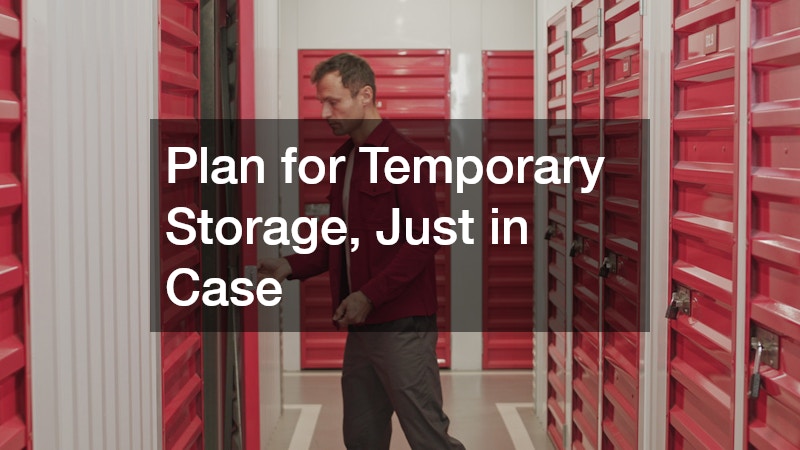

Preparing for a move can feel overwhelming, especially when there are countless details to manage and deadlines to meet. The difference between a stressful relocation and a smooth transition often comes down to preparation. While packing boxes and hiring movers are part of the process, the most successful moves involve planning well beyond the basics. From safeguarding your new home to organizing utilities and coordinating logistics, a solid strategy can help make sure you have a great moving day.
This guide explores essential ways to prepare for a great moving day. Each section focuses on one practical action you can take to improve the experience, from scheduling services in advance to inspecting your new property thoroughly. Whether you’re relocating across town or across the state, these tips can help you manage the chaos and start your next chapter with confidence. With thoughtful planning, the day you move can be productive, calm, and even enjoyable. Let’s take a closer look at the strategies that make a great moving day possible.
Create a Strategic Moving Timeline
A great moving day starts with a clear plan. Building a strategic timeline several weeks in advance can make every stage of your move easier to manage. This timeline should include benchmarks such as finalizing your move-out date, gathering packing supplies, and confirming access to your new property. Giving yourself a week-by-week breakdown of tasks allows you to steadily prepare without falling behind. Include buffer time for inevitable setbacks like weather delays or work obligations. It’s also smart to label and sort boxes based on rooms, which will save you major headaches when unloading. Keeping the timeline visible—on a fridge, calendar app, or notebook—helps keep your move on track. A visual timeline can serve as a motivating checklist and a source of calm during what can otherwise feel like chaos.
One of the earliest items to check off is booking reputable moving services. These professionals often fill their schedules weeks in advance, especially during peak moving season. By reserving your spot early, you can choose the best time slot and avoid being forced into less convenient options. Reliable moving services will also conduct pre-move assessments, so they can bring the right size truck and manpower. Be sure to communicate details like staircases, parking availability, and large or delicate items. This allows movers to come prepared and prevents delays or damage. With dependable help locked in, you’ll have a stronger foundation for a great moving day.
Book the Right Resources for the Journey
Planning the actual move requires thinking through every phase of the journey, especially when covering long distances. A move across town may be relatively simple, but long-distance relocations come with added complications. You’ll need to think through travel routes, fuel stops, lodging if the trip spans multiple days, and potentially coordinating with new employers or schools. Having contingency plans for road closures or vehicle troubles will keep your timeline from slipping. A great moving day often begins the day before, so it’s important to have your travel needs addressed well in advance. Consider preparing a travel bag with essential toiletries, documents, and clothing in case of delays. Small comforts can ease a long drive and help everyone arrive in better spirits.
If you’re preparing for long distance moving, it’s essential to select companies that handle out-of-area relocations with confidence. Not every mover is equipped for the logistics of transporting items hundreds of miles. Ask questions about tracking services, estimated delivery windows, and whether your belongings will be transferred between trucks. In some cases, it’s also worth discussing insurance coverage in the event of damage or loss. When the journey is long, preparation needs to be thorough. Coordinating long distance moving needs early ensures that your move stays on schedule, minimizing stress and contributing to a great moving day.
Clear Out What You Don’t Need
Another powerful way to set yourself up for a great moving day is to reduce how much you’re taking with you. Over time, it’s easy to accumulate items that serve no purpose or no longer bring value. Moving is the perfect opportunity to clean house. Go through each room and separate items into categories: keep, donate, sell, or discard. Consider the storage space in your new home and whether you’ll realistically use each item. If something has sat untouched for over a year, it’s probably time to let it go. Fewer belongings mean fewer boxes, less time spent packing, and potentially lower costs from movers.
When you’re removing a significant volume of items, scheduling dumpster rentals can be incredibly helpful. Rather than slowly filling trash bags or relying on curbside pickup, a rented dumpster allows you to clear out quickly and efficiently. This is especially useful for large furniture pieces, broken appliances, or garage clutter. Look for dumpster rentals that offer flexible delivery and pickup windows to align with your prep schedule. By making space early in the process, you simplify everything that comes after. Starting with a clean slate means you can focus your energy on what really matters for a great moving day.
Plan for Temporary Storage, Just in Case
Even the most well-orchestrated plans can change, which is why having a backup option for storage is wise. Sometimes move-in dates shift due to construction delays, closing issues, or unexpected repairs. In other cases, you may decide to stagger your move to make unpacking more manageable. For a truly great moving day, it’s helpful to have temporary solutions in place that allow you to stay flexible. Keeping options open also reduces pressure if your original plan hits a snag. Flexibility is one of the most underrated advantages you can give yourself when moving.
One option that many movers rely on is short-term access to storage facilities. These can bridge the gap between moving out and fully settling in. Look for storage facilities with climate-controlled units, 24-hour access, and month-to-month rental terms. If you’re moving with sensitive items like electronics, instruments, or antiques, climate control can be particularly important. Storage facilities can also serve as a staging area for seasonal gear or bulky items you won’t need immediately. By building this into your plan, you increase your ability to adapt and stay on track for a great moving day, no matter what unexpected turns occur.
Check All Security Measures Beforehand
Security should be a top priority as you transition into a new home. A great moving day can quickly go south if your belongings aren’t safe or your new place isn’t properly secured. Before moving in, consider doing a full review of all locks, windows, garage doors, and entry points. Older locks may be worn or previously duplicated, so upgrading them provides added peace of mind. Additionally, assess whether security cameras, motion lights, or smart lock systems make sense for your new location. With your new home empty, this is the ideal time to implement security upgrades without interference.
For critical security updates, working with a local locksmith is often the most efficient solution. They can rekey locks, install new deadbolts, and advise on other security improvements that may be needed. A local locksmith is also likely familiar with common security issues in the area and can recommend solutions tailored to your neighborhood. Don’t wait until after you’ve moved in to discover a faulty lock or unsecured access point. Taking care of this before moving day helps you settle in confidently and focus on getting organized, instead of scrambling to fix preventable problems. Peace of mind goes a long way toward having a great moving day.
Address Hidden Plumbing Issues in Advance
Plumbing may not be the first thing on your mind during a move, but ignoring it can lead to a rough start. Imagine arriving at your new home only to discover that a toilet won’t flush or the kitchen sink leaks. These are avoidable headaches that can be identified and resolved before moving day arrives. Schedule time to walk through the home and test all major plumbing fixtures—sinks, showers, toilets, and exterior spigots. Take note of slow drains, discolored water, or unusual sounds. This quick audit can reveal issues that weren’t disclosed or noticed during your initial walk-through.
To handle these concerns efficiently, it helps to contact a local plumber. They can assess the system more thoroughly, inspect for signs of root intrusion, check water pressure levels, and confirm the integrity of pipes and valves. A local plumber can often address small problems on the spot, reducing the risk of larger failures in the future. By handling plumbing proactively, you set the stage for a great moving day—one that doesn’t involve bailing out bathtubs or chasing down emergency repairs. Plumbing may be behind the walls, but its importance is front and center when it comes to comfort.
Make Sure Climate Control Is Functional
Temperature control plays a huge role in whether your first few days in a new home feel comfortable or miserable. A great moving day often involves hours of physical labor, so walking into a house that’s either sweltering or freezing can make unpacking feel even more exhausting. It’s a good idea to test the heating and cooling systems a few days before the move. Let the system run long enough to determine whether it reaches the desired temperature and cycles properly. If anything seems off—like loud noises, weak airflow, or inconsistent temperatures—take action immediately.
When systems underperform, contacting professionals who handle HVAC repair is your next step. These technicians can inspect and fix issues before they spiral into more expensive problems. HVAC repair may involve cleaning filters, repairing ducts, replacing thermostats, or restoring refrigerant levels. Catching problems early also helps you avoid surprise outages during extreme temperatures. With climate control in working order, your new home will be far more welcoming. That level of comfort contributes directly to a great moving day, turning your focus from temperature troubles to arranging furniture and settling in.
Do a Thorough Pre-Move Deep Clean
Cleaning is one of the most underrated ways to improve your moving experience. Even if your new home appears tidy, it’s likely accumulated dust, allergens, and grime that should be removed before you settle in. A great moving day is easier when you’re not navigating dusty corners or musty odors. Prioritize cleaning areas like inside cabinets, behind appliances, closet shelves, and baseboards. It’s also a good time to clean light fixtures and windows to let in maximum natural light. A fresh space creates a positive first impression and gives you a strong foundation for unpacking.
If the home has a fireplace, calling chimney cleaners should be part of your deep-cleaning checklist. Chimneys can harbor soot, animal nests, and blockages that may pose a fire risk or odor issue. Including this step with other clean-up tasks like carpet shampooing or air duct cleaning helps ensure a healthier indoor environment. Many homeowners also choose to steam-clean floors or repaint walls before moving furniture in. The more work you do upfront, the easier it is to get comfortable right away. Cleaning thoroughly before move-in transforms a blank space into a welcoming home and contributes to a great moving day.
Make Time for Pre-Move Home Inspections
While major systems like plumbing and HVAC get most of the attention, a comprehensive inspection should go even further. A great moving day depends on knowing that your new home is safe and functional from top to bottom. This includes checking attic spaces for insulation or pests, scanning the roof for damaged shingles, and testing all light switches and outlets. It’s also wise to walk the exterior of the home and examine the condition of siding, windows, and drainage systems. Addressing any concerns early prevents small problems from escalating into major repairs right after you move in.
In rural areas, part of this inspection should include arranging for septic inspections. This type of inspection can help verify that your waste system is functioning properly and not in need of pumping or repair. While this step might not be needed for every home, it’s vital in locations where municipal sewer systems aren’t available. In addition to septic inspections, look at smoke detectors, garage door openers, and crawl spaces to ensure nothing is overlooked. The goal is to enter your new home with complete confidence in its condition. That peace of mind goes a long way in creating a great moving day.
Review and Update Your Coverage
Insurance might be the last thing on your mind while packing you’re packing up your home, but it plays an essential role in protecting your investment. A great moving day includes knowing that if something goes wrong—damaged furniture, an accident on the road, or weather-related delays—you’re financially protected. Before the move, review your homeowners or renters policy to confirm what is and isn’t covered during transit. Some policies include moving protections automatically, while others require temporary add-ons. It’s also a good opportunity to update your new address, adjust your coverage limits, and ask questions about liability and personal property.
Reaching out to a local insurance agency can make this process much easier. Local agents are often familiar with the unique risks in your area, whether that’s flooding, wildfire, or extreme weather. They can help ensure you’re not underinsured during a period of transition when loss is more likely. A quick meeting or phone call could save you thousands in the event of a mishap. With your insurance squared away, you’ll walk into your new home with greater peace of mind. Protection and preparation go hand in hand when it comes to setting yourself up for a great moving day.
A successful move doesn’t happen by accident—it’s the result of detailed planning, early scheduling, and attention to things that others often overlook. Taking the time to evaluate systems, organize logistics, and address potential issues ahead of time makes the experience much smoother. Each step you take before moving day creates momentum and reduces the chance of unwelcome surprises. The more you prepare, the more confident and relaxed you’ll feel when the big day arrives.
From hiring trusted professionals to cleaning your new space and reviewing your insurance, every small decision contributes to a larger goal: a great moving day. This guide is meant to help you prioritize the tasks that truly make a difference. With everything in place, your move can be less stressful and more exciting. Enjoy the process, trust your preparation, and get ready to start the next chapter of your life with ease.



